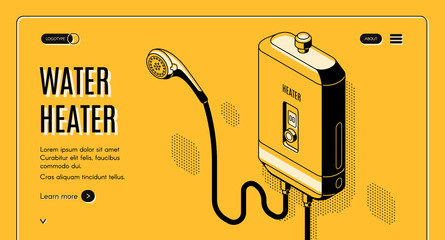Lower Your Bill by Utilizing Tankless Water Heaters

The tankless hot water heater is compact in size and essentially removes standby losses. They can offer warm water at remote points of use and less water is wasted while waiting on warm water to reach a remote faucet. These types of systems also have unique venting requirements and need to just be vented with a dedicated, sealed vent system. All producers recommend a particular brand name of the stainless steel vent pipeline. On-demand hot water heater (called demand-type or immediate) heat water as it is needed, and due to their compact size, are normally situated near the point of use. The lack of a storage tank and shorter distribution lines significantly lowers standby losses and increases performance. A tankless water heater is not rapid. It does take them about 2 seconds to go from there at rest "off" mode to producing warm water at the setpoint temperature. A tankless hot water heater may be mounted on walls, and are ideal in manufactured homes where space may be limited.
The tankless hot water heating system conserves energy by removing standby losses associated with standard, tank-style heaters. Even with excellent insulation around the tank, energy is undoubtedly lost to the surrounding air throughout time, even when you don't use any hot water. Tankless heaters are sized by circulation rate as measured in gallons per minute (GPM). Usually, a bathtub requires 4 GPM, showers 2.5 GPM, cleaning makers 3 GPM, dishwashing machine 3 GPM, and each sink 2 GPM. The tankless water heater has several advantages over conventional warm water heating units. The greatest benefit is the cost of running these units.
The tankless water heater has stringent venting codes and is best set up by an expert H.V.A.C company with certified professionals. The majority of these systems require direct (through the wall) venting with clearance guidelines. A tankless water heater bypasses the tank and routes heated water straight to taps or home appliances instead. Most water heaters are fueled by natural gas, although lp and electric water heaters are not uncommon. The tankless water heater heats up the water quickly when you switch on the faucet, rather than keeping a tank filled with warm water 24/7 whether you're utilizing it or not. Tankless heaters work on either electricity or gas, just like regular heaters, and all the various designs are rated on how many gallons are delivered per minute.
A tankless hot water heater, about the size of a medication cabinet, can be wall-mounted indoors or perhaps outdoors. Experience: The tankless hot water heater never ever runs out of hot water. So a tankless hot water heating system is ranked by the optimum temperature rise possible at a given circulation rate. To make sure that your system will provide sufficient hot water, figure out the flow rate and temperature increase you'll need.
Tankless hot water heater systems are extremely good and can be of extreme aid when it concerns the water heating in your house. One need to understand that there are many various models of tankless water heating unit systems readily available on the market. Tankless is fine under your conditions. Keep in mind that you can have a temperature level at a low volume however if you surpass that volume (two showers at once, etc.) the temperature will decrease. Tankless systems are small-very small-compared to traditional hot water heater. As a result, they can be set up practically anywhere, and it's easy to use multiple tankless systems to divide your domestic warm water supply into two zones. Buy best instant water heater Singapore here.
Tanks do not have the ability to properly control water temperature or energy usage. The included tankless advantage is optimal energy performance. Tankless does not work the like a conventional tank and you require to change. I will do either the solar pre-heat or HP pre-heat so she can turn on a tap, wash her hair, rinse a glass, meals, and so on.